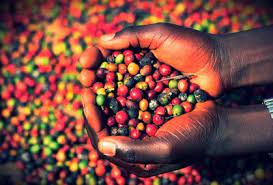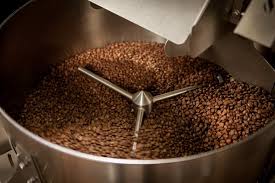Can You Grow Your own Coffee in the UK?

Can You Grow Coffee in the UK?
If you love both coffee and gardening, then you will have probably wondered at some point, 'Can I grow my own coffee?’ The short answer is yes, but there are some things you need to know first.
Would it be worth growing your own coffee? Can you buy UK cultivated coffee? While the concept of growing your own coffee sounds cool, these are just some of the other questions you need to think about. We have put together a list of things that you should consider before starting out on the journey of growing your very own coffee plants.

Where is The World's Coffee Grown?
The vast majority of coffee is grown in what is known today as 'The Coffee - Belt'. The coffee belt runs between The Tropic of Cancer and The Tropic of Capricorn that run parallel either side of the Equator. This stretches over Central America, South America, Indian subcontinent, Southeast Asia, Africa, Arabia and some Islands, the following countries are coffee producers in each region:
Central America - Guatemala, Costa Rica, Nicaragua, Honduras, Panamá, México & El Salvador.
South American - Brazil, Bolivia, Ecuador, Peru & Colombia.
Indian subcontinent - India, Nepal and Sri Lanka .
Southeast Asia - Vietnam, Thailand, Myanmar, Indonesia, & Papua Guinea .
Islands - Jamaica, Hawaii, Puerto Rico & Reunion Islands.
Africa - Congo (DRC), Burundi, Ethiopia, Rwanda, Kenya, Zimbabwe, Zambia, Tanzania & Uganda.
Arabia - Yemen and southern Saudi Arabia.
The reason that these countries are collectively known as the coffee belt is due to the fact that they all share similar weather conditions which include warm temperatures during the daytime but cool at night, lots of rain throughout the year, high humidity levels and fertile soil. This combination is what makes these countries the ideal places to cultivate coffee beans.

What Conditions Are Required?
For coffee to grow successfully there are several factors required including temperature, rainfall, sunlight hours, humidity level and soil type.
All of these elements must work hand-in-hand with each other if you wish to produce quality coffee. If any of these components do not meet their requirements, then the end result can be poor tasting coffee or coffee trees that produce a very low fruit yield (a low coffee cherry count).
For example, if the climate is too hot then the plant cannot absorb enough water from its roots, meaning less coffee cherry production. On the flip side, if the climate is cold, then the plant may struggle to survive. In addition, if the sun does not shine long enough, then the leaves will wilt and die off. Finally, if the air has low humidity levels, then the seeds won't germinate properly.
Soil Type
There are three main types of soils used when cultivating coffee – acidic, neutral and alkaline. Each of these different types of soil require specific amounts of nutrients to flourish. The most idyllic soil type being volcanic soil with deep red earth and a sandy loam for good drainage. This is not any easy soil type to find naturally in the UK.
Temperature
Coffee requires warmth to thrive. It needs around 18 degrees Celsius to 27 degrees Celsius to perform well. However, once the temperature drops below 10 degrees Celsius, then the growth rate slows down dramatically. Incidently, higher altitudes are optimal in the equatorial region for this main reason, as a wide range of temperatures between the day and night allows maximum growth and rest for the coffee plant's daily growing cycles.
Rainfall
As mentioned earlier, coffee thrives best under humid conditions, with specific seasons of rain and dry, it is ultimately a tropical forest plant. So, if you live somewhere where there isn't much rain, or too much rain, then you might find yourself with a sick coffee plant. Coffee needs seasonal rains to trigger the flowering, which then develop into the coffee cherries. Without these rains coming at specific times, the coffee seeds (beans) won’t develop well. The coffee beans are important as it what gives speciality coffee it's great taste.
Sunlight Hours
Coffee plants need a lot of sunshine to help it photosynthesise. Therefore, if you don't get enough light all year round then you'll never see those new green shoots appear on your trees, keeping the tree healthy and strong all year round.
Humidity level
This one is pretty self-explanatory, really. The more moisture present in the atmosphere, the better for your coffee bean crops. If there is not enough moisture in the air, then the seedlings will struggle to develop into healthy looking plants. A constant 50% ambient humidity level is ideal for cultivating coffee saplings.

Can coffee Grow in the UK's slightly chilly climate?
Yes, although it takes longer than most people would like to wait before harvesting your first batch of coffee beans. Coffee trees start to produce cherries between three and five years from germination. But, if you want to start now, then you can buy a young coffee tree and grow it as an indoor plant. Alternatively, you can also use a greenhouse to keep your plants safe from harsh winter weather.
How to Grow Your Very Own Coffee Tree
How long it takes to harvest a crop of coffee beans depends on how big your garden/greenhouse is and whether you've got plenty of space available. Generally speaking, though, it shouldn't take you more than two years to grow your very first batch of coffee beans if you purchase a mature tree.
However, if you decide to grow your own coffee tree, then you must ensure that you follow all the right steps. For starters, you'll need to choose which type of coffee tree you'd prefer to grow. Then, you'll need to select a location that gets at least six hours of sunlight every day. Next up, you'll need to prepare the ground by digging out any existing vegetation. Once you've done this, you'll need to add composted manure as fertilizer.
Don’t expect fast results like growing tomatoes. It may take as long as 5 years before you start seeing results from your efforts. During this period, you'll spend most of your time nurturing your seedlings into healthy young plants. Once they reach maturity, you'll begin harvesting your first batch of coffee beans.
When it comes to equipment for your coffee bean quest, depending on your setup, you may need to even invest in a humidifier or grow lamp to compensate for the natural environment. Next up, you'll need a sturdy trowel, which allows you to dig deep holes without damaging the root system of your coffee tree/trees.
You'll also need a watering can with a fine spray nozzle attached to it for that regular forest mist!. This way, you won't end up wasting water by over-filling your pots. Finally, a whole heap of patience and persistence.

Grow Your Own Coffee - (advantages/disadvantages)
Although growing your own coffee may seem like a daunting task, it doesn't have to be difficult. In fact, it could actually prove quite enjoyable once you get started. However, there are certain disadvantages associated with growing your own coffee beans.
Advantages
It saves money (depending on circumstances)
It helps reduce waste
It gives you complete control over the quality of your coffee
It provides a learning journey into the world of coffee production
It makes you feel better knowing where your food has come from
It reduces carbon footprint
It can improve health
Disadvantages
Requires substantial money up front.
Plants can be overrun by aphids and mites. Depending on the variety, coffee can be quite disease prone.
Requires close attention to be paid to your plants for a long period of time.
Large possibility of losing your whole crop due to bad weather conditions.
Coffee trees require lots of maintenance.
Growing your own coffee requires patience.
The process of picking coffee cherries is not only tedious but also messy
Producing the cherries is only the first step in production of coffee, there is a fermentation and drying process of the seeds (beans) followed by a roasting process before the coffee is ready to be prepared into your morning cup.
In the best conditions, one tree's average production of coffee will bring you approximately 0.5 kg of roasted coffee beans a year!
UK Grown Coffee Companies
There are actually several places in the UK that cultivates its own coffee, but mostly on very small scales. The main reason why these companies don’t produce enough quantity to meet their customers' demand is because of lack of capital.
At Bloss we decided to import our coffee from farmers around the world rather than grow it in the UK. This was for two reasons. Firstly, you’ll have noticed from the information above just how challenging it would be to grow coffee at scale anywhere, let-alone in the UK climate. Secondly and most importantly, we wanted to really get behind the coffee producers to do what we can to make it more ethical and sustainable for the farmers. By building relationships at the farms, we’re able to buy coffee year after year at a higher than market price straight from the source. We can help make a direct difference and impact many lives and communities around the world.
Buying coffee beans online from Bloss helps to support this simple vision and make the coffee industry a thriving profession for farmers.






